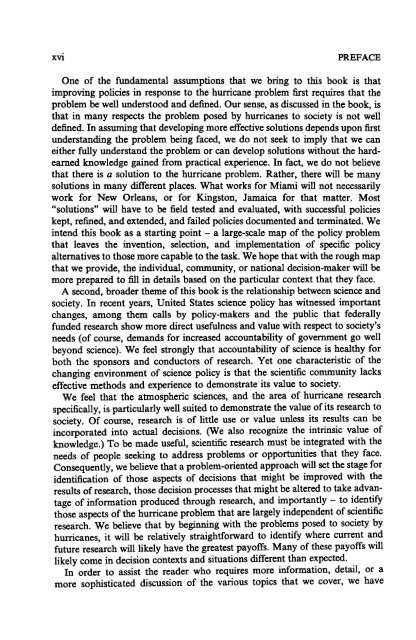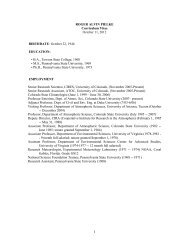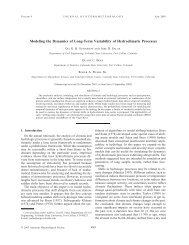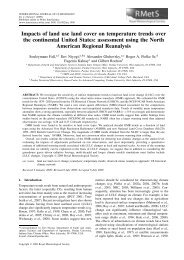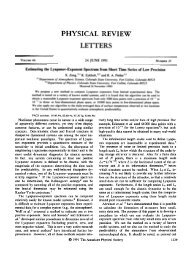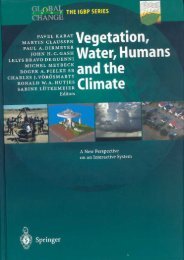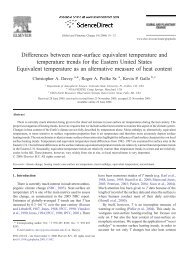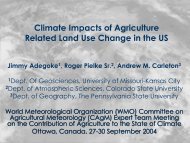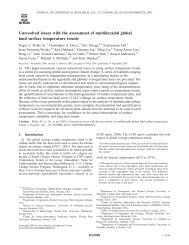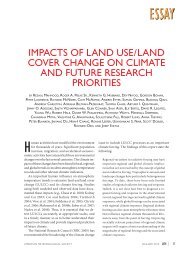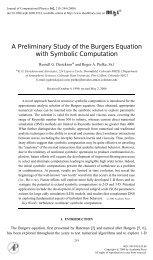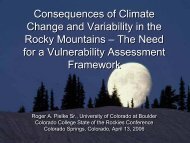Hurricanes: Their Nature and Impacts on Society - Climate Science ...
Hurricanes: Their Nature and Impacts on Society - Climate Science ...
Hurricanes: Their Nature and Impacts on Society - Climate Science ...
Create successful ePaper yourself
Turn your PDF publications into a flip-book with our unique Google optimized e-Paper software.
XVI PREFACE<br />
One of the fundamental assumpti<strong>on</strong>s that we bring to this book is that<br />
improving policies in resp<strong>on</strong>se to the hurricane problem first requires that the<br />
problem be well understood <str<strong>on</strong>g>and</str<strong>on</strong>g> defined. Our sense, as discussed in the book, is<br />
that in many respects the problem posed by hurricanes to society is not well<br />
defined. In assuming that developing more effective soluti<strong>on</strong>s depends up<strong>on</strong> first<br />
underst<str<strong>on</strong>g>and</str<strong>on</strong>g>ing the problem being faced, we do not seek to imply that we can<br />
either fully underst<str<strong>on</strong>g>and</str<strong>on</strong>g> the problem or can develop soluti<strong>on</strong>s without the hardearned<br />
knowledge gained from practical experience. In fact, we do not believe<br />
that there is a soluti<strong>on</strong> to the hurricane problem. Rather, there will be many<br />
soluti<strong>on</strong>s in many different places. What works for Miami will not necessarily<br />
work for New Orleans, or for Kingst<strong>on</strong>, Jamaica for that matter. Most<br />
"soluti<strong>on</strong>s" will have to be field tested <str<strong>on</strong>g>and</str<strong>on</strong>g> evaluated, with successful policies<br />
kept, refined, <str<strong>on</strong>g>and</str<strong>on</strong>g> extended, <str<strong>on</strong>g>and</str<strong>on</strong>g> failed policies documented <str<strong>on</strong>g>and</str<strong>on</strong>g> terminated. We<br />
intend this book as a starting point -a large-scale map of the policy problem<br />
that leaves the inventi<strong>on</strong>, selecti<strong>on</strong>, <str<strong>on</strong>g>and</str<strong>on</strong>g> implementati<strong>on</strong> of specific policy<br />
alternatives to those more capable to the task. We hope that with the rough map<br />
that we provide, the individual, community, or nati<strong>on</strong>al decisi<strong>on</strong>-maker will be<br />
more prepared to fill in details based <strong>on</strong> the particular c<strong>on</strong>text that they face.<br />
A sec<strong>on</strong>d, broader theme of this book is the relati<strong>on</strong>ship between science <str<strong>on</strong>g>and</str<strong>on</strong>g><br />
society. In recent years, United States science policy has witnessed important<br />
changes, am<strong>on</strong>g them calls by policy-makers <str<strong>on</strong>g>and</str<strong>on</strong>g> the public that federally<br />
funded research show more direct usefulness <str<strong>on</strong>g>and</str<strong>on</strong>g> value with respect to society's<br />
needs (of course, dem<str<strong>on</strong>g>and</str<strong>on</strong>g>s for increased accountability of government go well<br />
bey<strong>on</strong>d science). We feel str<strong>on</strong>gly that accountability of science is healthy for<br />
both the sp<strong>on</strong>sors <str<strong>on</strong>g>and</str<strong>on</strong>g> c<strong>on</strong>ductors of research. Yet <strong>on</strong>e characteristic of the<br />
changing envir<strong>on</strong>ment of science policy is that the scientific community lacks<br />
effective methods <str<strong>on</strong>g>and</str<strong>on</strong>g> experience to dem<strong>on</strong>strate its value to society.<br />
We feel that the atmospheric sciences, <str<strong>on</strong>g>and</str<strong>on</strong>g> the area of hurricane research<br />
specifically, is particularly well suited to dem<strong>on</strong>strate the value of its research to<br />
society. Of course, research is of little use or value unless its results can be<br />
incorporated into actual decisi<strong>on</strong>s. (We also recognize the intrinsic value of<br />
knowledge.) To be made useful, scientific research must be integrated with the<br />
needs of people seeking to address problems or opportunities that they face.<br />
C<strong>on</strong>sequently, we believe that a problem-oriented approach will set the stage for<br />
identificati<strong>on</strong> of those aspects of decisi<strong>on</strong>s that might be improved with the<br />
results of research, those decisi<strong>on</strong> processes that might be altered to take advantage<br />
of informati<strong>on</strong> produced through research, <str<strong>on</strong>g>and</str<strong>on</strong>g> importantly -to identify<br />
those aspects of the hurricane problem that are largely independent of scientific<br />
research. We believe that by beginning with the problems posed to society by<br />
hurricanes, it will be relatively straightforward to identify where current <str<strong>on</strong>g>and</str<strong>on</strong>g><br />
future research will likely have the greatest payoffs. Many of these payoffs will<br />
likely come in decisi<strong>on</strong> c<strong>on</strong>texts <str<strong>on</strong>g>and</str<strong>on</strong>g> situati<strong>on</strong>s different than expected.<br />
In order to assist the reader who requires more informati<strong>on</strong>, detail, or a<br />
more sophisticated discussi<strong>on</strong> of the various topics that we cover, we have


